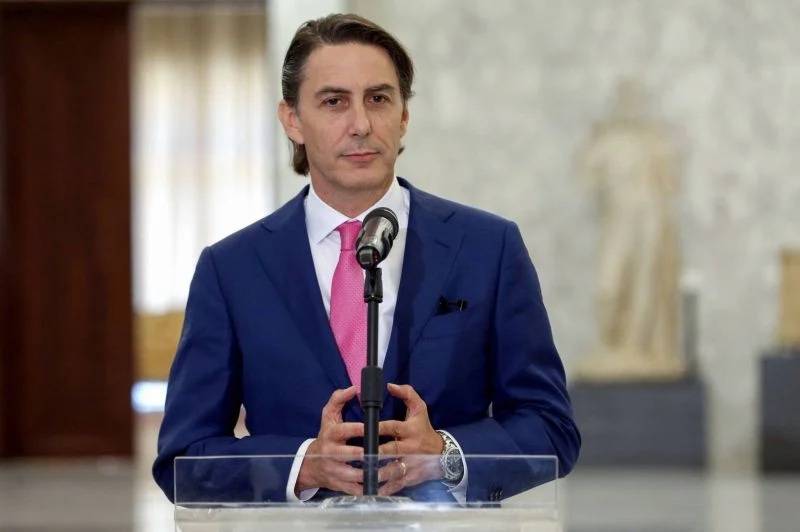
US mediator Amos Hochstein during a press briefing following his meeting Monday at Baabda Palace. (Credit: Dalati and Nohra/AFP)
US envoy Amos Hochstein arrived in Beirut on Sunday as part of his ongoing efforts to mediate between Israel and Lebanon over disputed maritime borders off the Mediterranean coast.
As is the case with every visit, details of negotiations are kept largely secret, with concerned stakeholders giving only an impression of what is going on in the talks.
Hochstein left Lebanon on Monday and said he was “very optimistic” about an agreement “in the coming weeks.”
Optimism was also relayed by the director of General Security Gen. Abbas Ibrahim, who said “everything is fine.” Parliament Deputy Speaker Elias Bou Saab, charged by the president to follow up on the file, also expressed optimism in few words.
“The gap is narrowing,” Bou Saab told the press, adding that the “atmosphere was positive, and everyone came out reassured from the meeting,” which was held at the Baabda Palace between Hochstein and the president, speaker and prime minister.
He added that negotiations were moving “within a short timeframe” and said results could emerge in the next few weeks.
Block 8, a windfall for Israel?
According to information obtained by L’Orient-Le Jour from sources close to the file, Israel would be ready to cede to Lebanon the entirety of the presumed gas field of Qana (which overlaps the Lebanese Block 8 and the Israeli Block 72).
In return, Israel is demanding maritime territorial compensation. In other words, it wants to claim part of Block 8 located in Lebanon’s exclusive economic zone.
It is therefore ready to grant Lebanon a maritime area of 860 square kilometers.
During the meeting at the Baabda Presidential Palace, Hochstein relayed the Israeli response to the Lebanese authorities.
It is very similar to the response already given to Lebanon at the end of June. At that time, Israel demanded financial compensation in addition to territorial compensation for the loss of part of the Qana field.
Israel continues to claim the maritime area that stretches from Line 23 in the east to the Hof line in the west, but seems to have relinquished any financial claims.
“The Israelis have indeed agreed to cede Qana to Lebanon. But they insist on obtaining an additional area at the level of bloc 8,” Charbel Skaff, an energy expert and university professor, told L’Orient-Le Jour.
Commenting on why Israel seems adamant to have this maritime zone, Skaff said, “It is most likely because it has seismic studies on the sedimentary layers in this block and other adjacent blocks, and it believes that they contain gas and oil resources.”
As for the financial compensation claimed in June, “Hochstein did not mention anything about it,” according to the expert.
Concordant sources, however, say that the issue was indeed discussed, although not at the same length as the territorial compensation, and that Lebanon also refused to give in on this point.
During his June visit to Beirut, Hochstein met with the Lebanese authorities who relayed their proposal on their maritime border claims. A deal between the two sides on this contentious issue is essential before any offshore exploitation.
But since the arrival of a gas rig in the Karish field, off the Israeli coast, tensions between the enemy states have rekindled. In early July, Hezbollah sent three drones in the direction of Karish, which were intercepted by the Israeli army.
On Sunday, Hezbollah released footage of Israeli ships in the Karish field, with the words “within range” in Arabic and Hebrew — the latest in a series of warnings from Hezbollah leader Hassan Nasrallah to Israel that it does not have the right to exploit the gas field as long as Lebanon cannot start drilling for its offshore gas, i.e., the Qana field.
It remains, however, unclear whether or not the field is rich in hydrocarbons.
Extended meeting with the three top officials
Everything suggests that talks are moving forward: optimism is being expressed by both parties, and Hochstein has promised to return quickly to Lebanon.
But what marked this round of talks was the extensive meeting that was held in the Baabda Palace — the first of its kind since the beginning of negotiations.
Hochstein met with President Michel Aoun, Parliament Speaker Nabih Berri and Prime Minister-Designate Najib Mikati.
“I remain optimistic that we can make continuous progress as we have over the last several weeks and I look forward to being able to come back to the region to make the final arrangement,” Hochstein said at the end of the meeting with the three top leaders.
“It was important to show the unity of the official Lebanese position,” a source close to the Baabda Presidential Palace told L’Orient-Le Jour, referring to the tug-of-war at home regarding Lebanon’s maritime claims.
In the circles close to the presidency, much more importance is given to the Lebanese position than to the answer given by Hochstein.
“He did not give a proper answer,” the source said. “He mainly listened to the Lebanese demands and discussed with his interlocutors, while promising to come back within two weeks to continue the negotiations, as the gap between the two sides [Lebanon and Israel] appears to narrow,” he added.
As for the Lebanese position, it remains unchanged.
“Lebanon remains firmly committed to Line 23 as already proposed by the president. In other words, a straight line that includes the Qana field,” the source added.
Lebanon’s rejection
The Lebanese authorities insist on having exclusive rights to the Qana hydrocarbon field.
They also refuse to give up even one mile of their Blocks 8, 9 and 10, part of which is located in an area disputed with Israel. Lebanon opposes any Israeli exploration before these demands are met.
“It is out of the question to divide the Qana field and share its resources or revenues with Israel. It is also out of the question to divest ourselves of the other blocks that are rightfully ours,” the source close to Baabda said in a rejection of the Israeli request.
According to L’Orient-Le Jour’s political columnist Mounir Rabih, Lebanon considers that it has already made enough concessions by abandoning its primary claim to Line 29.
Once again, the Israeli response is pending. But optimism seems to be the order of the day.
“All that remains are last-minute maneuvers to consolidate positions and obtain a maximum of demands from both sides,” Skaff said.
This article was originally published in French in L'Orient-Le Jour.
